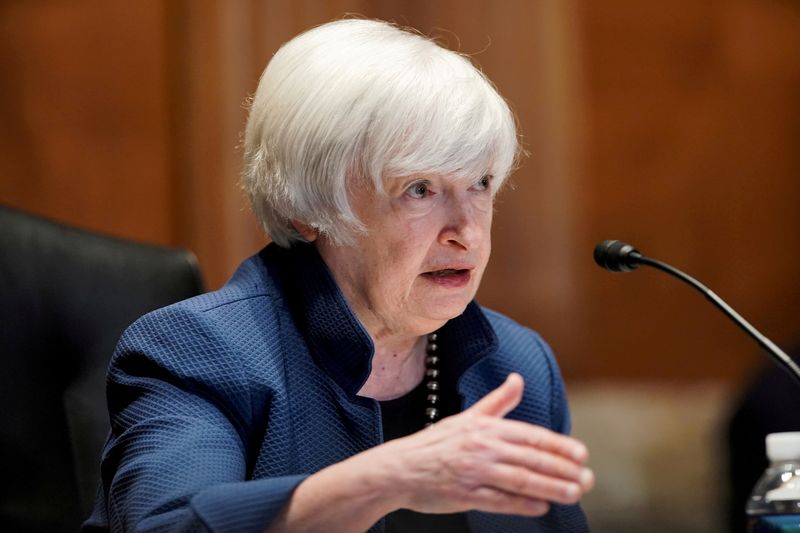By Ann Saphir
(Reuters) -Treasury Secretary Janet Yellen says failure to raise the U.S. debt limit could lead to the unthinkable: a default on government payment obligations. That's an outcome the White House on Friday warned could plunge the economy into recession.
If the impasse in Congress over the $28.5 trillion debt limit isn't resolved before an October deadline, what would the Federal Reserve - the backstop for U.S. financial markets as the lender of last resort - be prepared to do?
As it turns out, Fed Chair Jerome Powell may already have something of a game plan. The country faced a similar crisis over the debt limit in 2011 and again two years later, and at an unscheduled October 2013 meeting, Fed policymakers - including Powell, who was then a Fed governor, and Yellen, who was the Fed's vice chair - debated possible actions in response.
'Loathsome' was how Powell described some of the most aggressive options contemplated, transcripts show, though he was among those who said they might be needed in the face of what could be a drastic market catastrophe.
'COME OUT SWINGING'
The plan included a process for managing government payments, given the Fed's expectation that Treasury would prioritize principal and interest but would make day-by-day decisions on whether to cover other obligations.
Changes to the Fed's supervision of banks were also planned. Banks would be allowed to count defaulted Treasuries toward risk-capital requirements, and supervisors would work directly with any bank experiencing a "temporary drop in its regulatory capital ratio." The U.S. central bank would also direct lenders to give leeway to stressed borrowers.
Policymakers also mapped out approaches to managing market strains and financial stability risks stemming from a technical default.
They readily agreed to some measures, including expanding ongoing bond purchases to include defaulted Treasuries, lending against defaulted securities and through the Fed's emergency lending window, and conducting repurchase operations to stabilize short-term financial markets.
Other actions sketched out in briefing notes and during the meeting were more controversial, including providing direct support to financial markets buying defaulted Treasury securities, or simultaneously selling Treasuries that are not in default and buying ones that are.
It was those last actions that Powell described as "loathsome," while others referred to them as "repugnant" and "beyond the pale." The issue, transcripts suggest, was the worry that such purchases could be seen as crossing a line into direct financing of government.
"The economics of it are right, but you'd be stepping into this difficult political world and looking like you are making the problem go away," Powell said at the time.
A larger number of policymakers, including Yellen and John Williams, who at the time was San Francisco Fed president and is now head of the New York Fed, felt that such an intervention ought to be part of the U.S. central bank's response if needed. Even Powell agreed it might need to be "under certain circumstances."
Congress resolved the debt limit impasse in 2013 and the Fed never had to activate its game plan. Since then it has managed through a number of crises, including the coronavirus pandemic, to which it responded aggressively and with never-before-used tools like purchases of municipal debt. "We crossed a lot of red lines that had not been crossed before," Powell said in an interview in May 2020.
Analysts say that the Fed helped stave off a financial crisis and an even worse economic downturn.
Christopher Russo, a post-graduate research fellow at the Mercatus Center at George Mason University, says the Fed's experience may color how it responds to future crises.
"The lesson learned is: if they are going to do something, come out swinging," he said.
